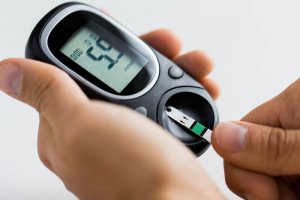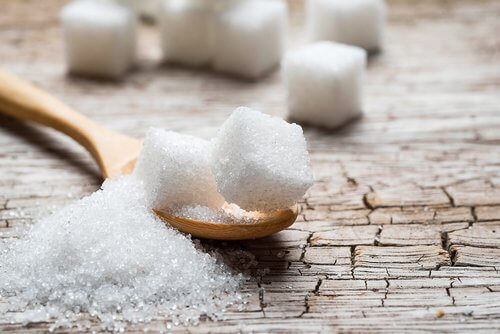7 Ways to Control High Blood Sugar Levels

Blood sugar levels across the world have risen significantly over recent decades due to an increase in sugar intake.
There are countless sugary products on the market, such as soft drinks, candy, chocolate, pastries, etc. There are even products you would never suspect of containing sugar, like crackers, pasta, and packaged foods.
These types of food have affected the health of many and are one of the main causes of the following conditions:
- Obesity
- Glucose intolerance
- Type 2 diabetes
- Excess weight
High blood sugar levels
Hyperglycemia is when blood glucose levels are high; it’s the result of a lack of or an insufficient amount of insulin.
- The first step is to check your glucose levels with a glucose meter.
- If your levels are higher than 180 mg/dl, you should be treated by a doctor right away, as this can lead to serious health issues.
Controlling and lowering blood sugar levels
1. Lower your daily sugar intake

- Choose low glycemic foods and pay attention to the type and amount of ingredients they contain.
- Eat more fresh fruit and vegetables.
- Aim for a diet that’s healthy, varied, and balanced, and avoid foods that are high in fat.
- Include protein and healthy carbohydrates like whole grains in your meals.
See also:
2. Add flaxseed to your diet
Flaxseed can be consumed whole, ground, as a tea or an oil. Flaxseed provides many health benefits such as:
- A lower risk of heart disease
- Cancer prevention
- Reduction of bad cholesterol (LDL)
Consuming 10 to 20 grams of ground flaxseed over a long period of time can reduce blood sugar levels by 20%.
3. Exercise daily

Physical activity regulates blood sugar levels, since muscles burn glucose to create energy and move around, leading to less sugar in the blood.
Make sure to measure your levels regularly to determine what exercise is best for you and to avoid sudden drops in blood sugar.
4. Stay hydrated
Drinking at least 2 liters of water per day rehydrates blood cells, lowers sugar levels, and reduces the risk of developing diabetes.
Staying hydrated is crucial to the good function of your kidneys, which are responsible for ridding the blood of excess sugar through urine.
- Water and calorie-free beverages are most recommended.
- Avoid sweetened drinks, since they can lead to weight gain and raise blood glucose levels.
5. Manage your stress levels

Relaxation and meditation reduce stress and lower blood sugar levels on top of providing many benefits for your body and mind.
Practice exercises and relaxation methods like:
- Meditation
- Yoga
- Mindfulness
The above suggestions are very helpful in lowering sugar levels, as well as improving overall health.
Make sure to check out:
Drink Your Way to Calm with Stress-Reducing Beverages
6. Get enough sleep
Proper rest is crucial to maintaining good health. Poor sleep habits impact blood sugar levels and insulin sensitivity.
As such, they can increase appetite and lead to weight gain.
7. Add cinnamon to your diet

Cinnamon offers many health benefits and can be consumed in its stick or powder form.
Some studies show that it can lower blood sugar levels by as much as 29%. Cinnamon acts similar to insulin, only much more slowly.
Final recommendations
- Consult your physician before making any lifestyle or diet changes.
- There are many natural alternatives available to lower blood sugar that are not contraindicated.
- Remember to lose weight and eat a balanced diet.
- Measure your sugar levels regularly.
- You must undergo a blood test to know your levels; your doctor will advise you accordingly.
If you have any doubts, you can consult with a dietitian who can recommend a diet that’s appropriate for you.
A balanced diet and a healthy lifestyle are essential for preventing illnesses and staying in good health.
All cited sources were thoroughly reviewed by our team to ensure their quality, reliability, currency, and validity. The bibliography of this article was considered reliable and of academic or scientific accuracy.
- Foldes, E. (1947). Diabetes and hypertension. The American Journal of Medicine. https://doi.org/10.1080/13854040802368684
- Diabetes.co.uk. (2017). Blood Sugar Level Ranges. https://doi.org/10.1016/j.bbadis.2016.09.015
- Brown, I. J., Stamler, J., Van Horn, L., Robertson, C. E., Chan, Q., Dyer, A. R., … Elliott, P. (2011). Sugar-sweetened beverage, sugar intake of individuals, and their blood pressure: International study of macro/micronutrients and blood pressure. Hypertension. https://doi.org/10.1161/HYPERTENSIONAHA.110.165456
- Clarke, S. F., & Foster, J. R. (2012). A history of blood glucose meters and their role in self-monitoring of diabetes mellitus. British Journal of Biomedical Science. https://doi.org/10.1080/09674845.2012.12002443
- Sleep Foundation. The Link Between a Lack of Sleep and Type 2 Diabetes. Recuperado el 19 de octubre de 2020. https://www.sleepfoundation.org/articles/link-between-lack-sleep-and-type-2-diabetes
- The Global Diabetes Community. Stress and Blood Glucose Levels. (2019). Recuperado el 19 de octubre de 2020. https://www.diabetes.co.uk/stress-and-blood-glucose-levels.html#:~:text=When%20the%20body%20is%20under,of%20glucose%20in%20the%20bloodstream.
- Clínica Mayo. Análisis de azúcar en sangre. Por qué, cuándo, y cómo. (2020). Recuperado el 19 de octubre de 2020. https://www.mayoclinic.org/es-es/diseases-conditions/diabetes/in-depth/blood-sugar/art-20046628
- National Health Services. Hyperglycaemia (high blood sugar). (2018). Recuperado el 19 de octubre de 2020. https://www.nhs.uk/conditions/high-blood-sugar-hyperglycaemia/
- Hutchins, A. M., Brown, B. D., Cunnane, S. C., Domitrovich, S. G., Adams, E. R., & Bobowiec, C. E. (2013). Daily flaxseed consumption improves glycemic control in obese men and women with pre-diabetes: A randomized study. Nutrition Research. https://doi.org/10.1016/j.nutres.2013.02.012
This text is provided for informational purposes only and does not replace consultation with a professional. If in doubt, consult your specialist.








